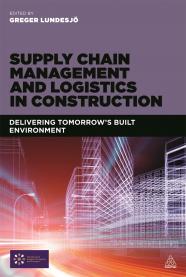The construction logistics manager plays an increasingly central role in the construction process. In fact, their decisions can crucially affect the success or failure of a project. Recognition of the critical role they play has spurred evermore interest in this budding field amongst both researchers and practitioners.
Relevance in urban freight
A large share of the freight traffic in cities is related to construction leading to 25 tot 30 percent of green house gasses related to urban freight. Construction is required to create attractive, sustainable and economically viable cities. When activities at and around construction sites are not managed effectively, they can negatively impact the surrounding areas. Evaluation of recent urban construction projects introducing logistics concepts by construction companies shows that implementing alternative concepts can significantly reduce total logistic costs, urban congestion and improve productivity and safety.
Supply Chain Management and Logistics in Construction
An accessible book on construction logistics, Supply Chain Management and Logistics in Construction by Greger Lundesjö, provides essential guidance and expert advice for construction managers, as well as researchers and students in the field.
This book looks at arrangements with suppliers, the use of returnable packaging and off-site manufacture and assembly, IT systems used to manage the supply chain and logistics operations, such as delivery management systems, warehouse management systems, material planning and forecasting systems and using the Building Information Model (BIM) for improved planning upstream and downstream in the supply chain.
It also considers aspects of the contractual relationships between client, developer, main contractor and lower-tier contractors, all of which have an impact on how the supply chain is managed. The book provides useful checklists for making construction logistics plans.
For more information: click here.


